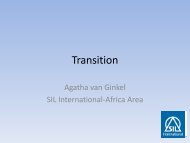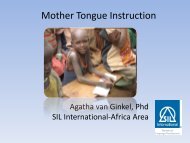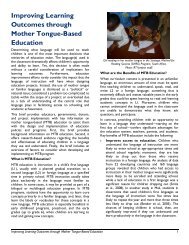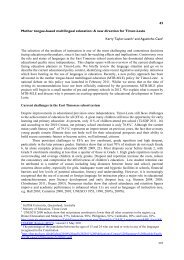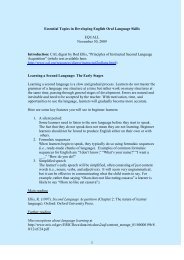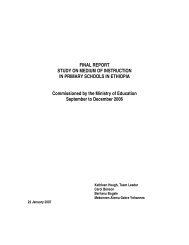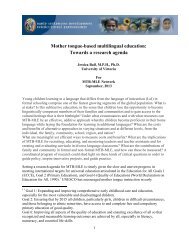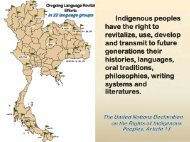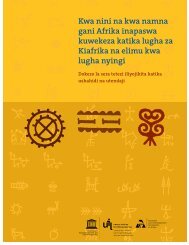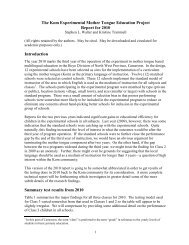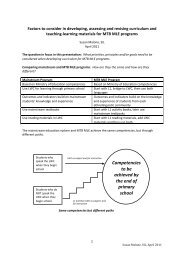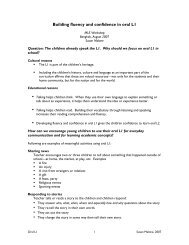Part I.pdf - MTB-MLE Network
Part I.pdf - MTB-MLE Network
Part I.pdf - MTB-MLE Network
Create successful ePaper yourself
Turn your PDF publications into a flip-book with our unique Google optimized e-Paper software.
ole of local government in making the best use of local resources in the development process.Results are positive: the economic growth rate has reached 4-5%, the current inflation rate (2004)is about 7/8%, and income per capita is US$ 830 per year.In Indonesia, education is implemented through both the formal and non-formal system. In 2003,literacy programmes targeted about 7 million people between 10-44 years old. The implementationof literacy in Indonesia has become the responsibility of the Directorate of Community Education,the Directorate General of Out-of-School Education and Youth, and the Department of NationalEducation.National policies and strategies on literacy in Indonesia cover the expansion of the formerprogramme, which only focused on the eradication of illiteracy, prioritizing people aged 15-44,into a three-level programme for literacy development: basicskills, guided learning, and self-learning. There is a plan toexpand access to functional literacy in order to meet a widerange of learning needs for diverse levels of learners living inall parts of Indonesia. The new approach aims to develop thecapacity of local staff and organizers for both programme designand implementation.In general, government policies related to mother tongue inIndonesia are based on Indonesia’s Constitution (Undang-Undang Dasar 1945) – particularly the article concerninglanguage – and Article 20 of the Constitution (2003) concerningthe national education system. Article 20 specifically enablesthe mother tongue to be the delivery language of teaching/learning activities. There have not been many multilingualliteracy programmes implemented in Indonesia in relation tothe number of languages used in the country – there are nearly700 vernaculars throughout the 30 provinces of Indonesia. Literacy programmes in Indonesia areimplemented by both government and non-governmental organizations.The Sundanese and Sasak languages are the focus of the pilot programme for the UNESCO-APPEAL“Mother Tongue/Bilingual Literacy Programme for Ethnic Minorities” project. Learning media ismainly focused on literacy, income generation and basic knowledge related to daily activities.The central theme of the pilot project is “The Development of a Learning Model for FunctionalLiteracy Integrated with Community Development Using the Mother Tongue Approach.” Theobjective is to develop a model for literacy that enables learners to:• develop bilingual literacy capability beginning with their mother tongue,• use literacy competencies to improve their quality of life,• wisely harness natural resources as daily living/income resources, and• mobilize every resource they have for community development.17



